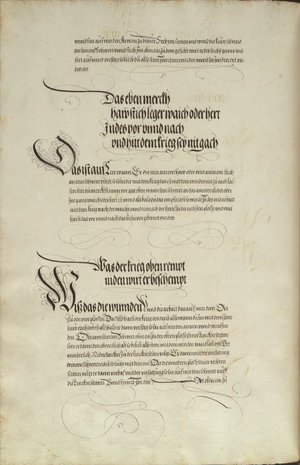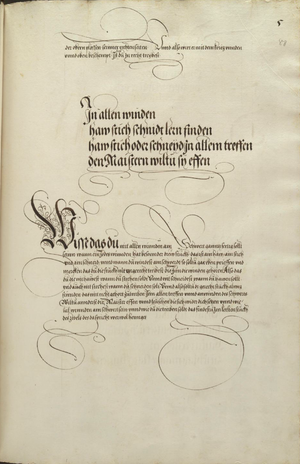|
|
You are not currently logged in. Are you accessing the unsecure (http) portal? Click here to switch to the secure portal. |
User:Kendra Brown/Latin Lew/Piece 021
Contents
Dresden
German
Transcription
[3] Was der krieg oben rempt
niden wirt er beschempt
Wisz das die winnden Vnnd die arbait darausz mit dem Ort zu den vier plössen Dasselb haist der krieg. den treib also wann du Im mit dem zornhaw einhawest. Alsz bald er dann versetzt so far auf mit den armen vnnd wind Im den Ort ann seinem Schwert oben ein zu der obern plosse seiner Lincken seite. setzt er dann den obern stich ab. so beleib also steen mit dem winden. vnnd lasz den Ort vnndersich Nidersincken zu der lincken seiten volgt Er dann mit der versatzung deinem schwert nach so suche mit deinem Ort die vnndern plösse seiner rechten seite. volgt er dann virbas mit der versatzung so far auf mit dem schwert auff die Lincken seite. Vnnd henng Im den ~~~~ Ort oben ein zu
[1] der obern plössen. seinner rechten seiten. Vnnd also wirt er mit dem krieg vnnden vnnd oben beschempt. Ist das du In recht treybest.
Sandbox German
- In allen winden
- haw stich schnidt lern finden
- haw stich oder schneÿd In allem treffen
- den Maistern wiltu in effen
- Wisse daß du mit allen winnden am Schwert gannz fertig sollt seinn,
- wann ein Jedes winnden,
- hat besonnder drew stuckh,
- das ist ain haw,
- ain stich und ain schneid,
- vnnd wann du windest,
- am schwerdt,
- so soltu gar eben prieffen,
- und mercken das du die stückh nit ungerecht treibest,
- die Inn die winden gehören,
- Also das du die nit hawest,
- wann du stechen soldt,
- Vnnd nit schneidest,
- wann du hawen sollt,
- und auch nit stechest wann du schneiden solt,
- Vnnd also soltu dz,
- gerecht stuckh alweg finnden,
- das mit recht gehort,
- zutreiben,
- Inn allen treffen,
- vnnd anwinden des Schwerts,
- Wiltu annderst die Maister effen,
- vnnd teuschen die sich wider dich setzen,
- vnnd wievil winnden am schwert sein,
- vnnd wie du die treiben soldt,
- daß findestu Im letsten stückh deß zedels,
- deß da spricht,
- wer wol hennget
English
Sandbox English from German
- Learn to find the cut, thrust, slice
- In all twists.
- Cut, thrust, or slice in all encounters
- with the Masters, if you want to fool them.
- Know that you should be completely prepared with every twists on the sword.
- Because every winding
- has three different techniques:
- That is a cut,
- a thrust and a slice.
- And whenever you twist
- on the sword,
- you should check, precisely at that time,
- and take note that you do not incorrectly execute techniques
- that are part of twists.
- Therefore, that you do not cut
- when you should thrust,
- and do not slice
- when you should cut,
- and also do not thrust
- when you should slice.
- And therefore, you should always
- find the correct technique
- that is correctly understood
- to be executed
- in every exchange
- and every twists on of the swords.
- Secondly, if you want to fool the masters
- and deceive those who oppose you.
- And you will find in the last part of the Zedel [didactic poem] *
- at the point which says,
- “Who hangs well, ...”,
- how many twists there are,
- and how you should execute them.
Note that lines 25-27 in the English follow lines 28-29 in the German.
Smooth English from German
- Learn to find the cut, thrust, slice
- In all twists.
- Cut, thrust, or slice in all encounters
- with the Masters, if you want to fool them.
Know that you should be completely prepared with every twists on the sword, because every twists has three different techniques: that is a cut, a thrust and a slice. And whenever you twist on the sword, you should check, precisely at that time, and take note that you do not incorrectly execute techniques that are part of twists. Therefore, that you do not cut when you should thrust, and do not slice when you should cut, and also do not thrust when you should slice. And therefore, you should always find the correct technique that is correctly understood to be executed in every exchange and every twists on of the swords.
Secondly, if you want to fool the masters and deceive those who oppose you. And you will find in the last part of the Zedel [didactic poem] at the point which says, “Who hangs well, ...”, how many twists there are, and how you should execute them.
Munich
Latin
Transcription
[3] Item cum adversarius ex forma punctionis vel Ictus ensem tuum contigerit, in primo conflictu, tu noli exercere statim Ictus crebros, sed festina lentè, et maximè curabis, ut prius observes num in ensium collisione molliter vel fortiter ensem teneat, Sin id deprehenderis, uti poteris intorsionibus, atque crebris ictibus quem habitum nos Germani bellum appellamus appetendo nuditates proximè obvias.
Sandbox Latin
- Intorsiones sollerter exercere noveris,
- Unaquaque enim tribus constat habitibus,
- hoc est, Ictu, Punctione, atque incisione,
- si igitur ijs uti volveris,
- maxima cura sit, ut eas iuste et artificiosè exerceas,
- ne si pungendum sit,
- tu ferias,
- neve pungas vel proscindas,
- si feriundum sit.
- his igitur si rite usus fueris,
- facile cunctos,
- qui contra te certant,
- decipies,
- reliquas autem intorsiones in subsequentibus,
- et quot eorum sint habitus,
- reperies.
English
Sandbox English from Latin
- You should learn to skillfully practice Wrappings ,
- namely, it consists of three skills in the art,
- that is: the Strike, Thrust, and Slice,
- therefore, if you wanted to use the same,
- pay the most attention [so] that you practice them rightly and skillfully,
- if thrusting is incorrect,
- YOU should strike,
- and not thrust or gash,
- if striking is correct.
- Therefore if you had done these properly,
- all of them easily,
- those who contest against you,
- [whom?] you are deceiving,
- the remainder on the other hand the [action of] further wrapping in pursuit
- and however many would be their action,
- you will catch [them].


